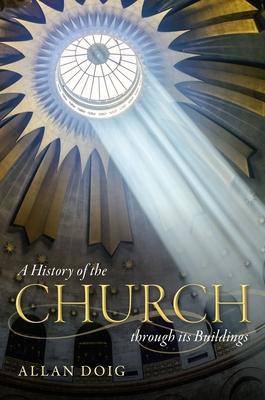A History of the Church through its Buildings takes the reader to meet people who lived through momentous religious changes in the very spaces where the story of the Church took shape. Buildings are about people, the people who conceived, designed, financed, and used them. Their stories become embedded in the very fabric itself, and as the fabric is changed through time in response to changing use, relationships, and beliefs, the architecture becomes the standing history of passing waves of humanity.
This process takes on special significance in churches, where the arrangement of the space places members of the community in relationship with one another for the performance of the church’s rites and ceremonies. Moreover, architectural forms and building materials can be used to establish relationships with other buildings in other places and other times. Coordinated systems of signs, symbols, and images proclaim beliefs and doctrine, and in a wider sense carry extended narratives of the people and their faith. Looking at the history of the church through its buildings allows us to establish a tangible connection to the lives of the people involved in some of the key moments and movements that shaped that history, and perhaps even a degree of intimacy with them. Standing in the same place where the worshippers of the past preached and taught, or in a space they built as a memorial, touching the stone they placed, or marking their final resting-place, holding a keepsake they treasured or seeing a relic they venerated, probably comes as close to a shared experience with these people as it is possible to come. Perhaps for a fleeting moment at such times their faces may come more clearly into focusâ€]| FindBook |
有 1 項符合
A History of the Church Through Its Buildings的圖書 |
 |
A History of the Church Through Its Buildings 作者:Doig 出版社:Oxford University Press, USA 出版日期:2021-02-01 語言:英文 規格:精裝 / 320頁 / 普通級/ 初版 |
| 圖書館借閱 |
| 國家圖書館 | 全國圖書書目資訊網 | 國立公共資訊圖書館 | 電子書服務平台 | MetaCat 跨館整合查詢 |
| 臺北市立圖書館 | 新北市立圖書館 | 基隆市公共圖書館 | 桃園市立圖書館 | 新竹縣公共圖書館 |
| 苗栗縣立圖書館 | 臺中市立圖書館 | 彰化縣公共圖書館 | 南投縣文化局 | 雲林縣公共圖書館 |
| 嘉義縣圖書館 | 臺南市立圖書館 | 高雄市立圖書館 | 屏東縣公共圖書館 | 宜蘭縣公共圖書館 |
| 花蓮縣文化局 | 臺東縣文化處 |
|
|
圖書介紹 - 資料來源:博客來 評分:
圖書名稱:A History of the Church Through Its Buildings
內容簡介
作者簡介
Allan Doig, Emeritus Fellow of Lady Margaret Hall, University of Oxford
Sermons on the Final Verses of the Song of Songs: Volume III
Devotional Comforted by God Faux Leather
Healing Together: Trauma Informed Care for Spiritually Integrated Communities
Faith in the Midst
Mediæval Mystical Tradition and Saint John of the Cross
Mediæval Mystical Tradition and Saint John of the Cross
Wisdom: Making Godly Decisions
Wisdom: Making Godly Decisions
Wisdom: Making Godly Decisions
Mr. Jones, Meet the Master: Sermons and Prayers of Peter Marshall
Devotional Comforted by God Faux Leather
Healing Together: Trauma Informed Care for Spiritually Integrated Communities
Faith in the Midst
Mediæval Mystical Tradition and Saint John of the Cross
Mediæval Mystical Tradition and Saint John of the Cross
Wisdom: Making Godly Decisions
Wisdom: Making Godly Decisions
Wisdom: Making Godly Decisions
Mr. Jones, Meet the Master: Sermons and Prayers of Peter Marshall
|










